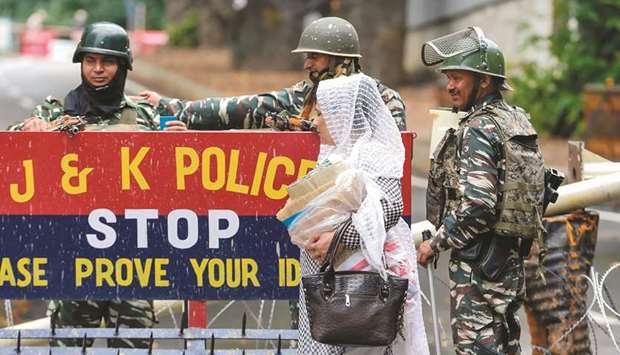Authorities began easing an almost two-week-long communications and security lockdown in Jammu and Kashmir yesterday, with officials announcing that landline telephone services had been partially restored.
The communications blackout has been in place following the federal government’s decision to scrap Article 370 of the constitution, which granted autonomy for the Muslim-majority state, and split it into two federally administered territories.
The restrictions on telecommunications, assembly and travel, which were initially placed over the entire state, had been largely eased in the Jammu region, where Internet facilities had been restored, according to government spokesman Rohit Kansal.
Restrictions, however, continued in parts of the Kashmir Valley area, including the state’s main city, Srinagar.
Restrictions on travel and assembly had been partially eased in 35 police station areas throughout the valley, Kansal said at a media briefing in Srinagar.
“While the situation is being closely watched, there have been no untoward incidents reported so far. Public transport has started plying, and we are getting encouraging reports of normal movement from a lot of rural areas.”
Kansal said 17 of 96 landline telephone exchanges had been made operational in the valley, and the aim was to restore 50% of services by today.
However, mobile and and Internet restrictions continued.
“These services will be restored successively and in a calibrated manner,” Kansal added.
There were plans to open educational institutions, beginning with primary schools, soon, and there would be full functionality of government offices tomorrow, Kansal said.
The local administration in Srinagar has requested residents not to “rush for panic shopping” when restrictions were lifted, saying there were abundant stocks and the administration was committed to making them available for all.
The moves came even as there were celebrations and protests by Kashmiris opposed to the Indian policy in Srinagar on Friday night.
The celebrations were to mark the first United Nations Security Council meeting about the Kashmir issue for about five decades.
Two police officials and a series of eyewitnesses said that demonstrations and celebrations took place in various parts of the city.
However, the number of incidents of local residents pelting security forces with stones were low compared with recent days, said a security official who toured Srinagar in the morning.
A witness said that hundreds marched in the Rajouri Kadal area of Srinagar and they also let off some firecrackers.
They shouted pro-Pakistani and anti-India slogans during the celebrations, two witnesses said.
The authorities deny there has been a curfew in the past two weeks but on many occasions people have been ordered to stay indoors.
Critics say the decision to revoke the state’s autonomy will cause further alienation and fuel the armed resistance.
The change will allow non-residents to buy property in Jammu and Kashmir and end the practice of reserving state government jobs for local residents.
Prime Minister Narendra Modi’s government has said the revocation of Kashmir’s special status was necessary to ensure its full integration into India and speed up development.
Despite the relaxation, the situation is still far from normal in Kashmir.
There is still a lockdown in much of the region, including in some parts of Srinagar and in sensitive major towns, witnesses said.
There is also no clear indication about when Internet and cell phone links will be restored across the region.
Meanwhile, more than 500 political or community leaders and activists remain in detention, some of them having been flown to prisons outside the state.
Some private vehicles were out on major roads in Srinagar yesterday but the city’s old quarter, long a centre for protests, was deserted, witnesses said.
Shops, even grocery stores, remained closed in that area.

Security personnel stand guard as a woman walks past them in Srinagar yesterday.
